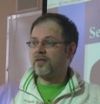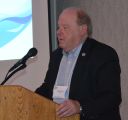FLASHBACK TO 2010: “The way we see the world is shaped by our vocabulary,” observed Metro Vancouver’s Robert Hicks when commenting on ‘what is an appropriate term to use’ for different uses of water in different languages

“Other languages like French and German often use more exact terms than English for 'stormwater' and 'wastewater', and this changes how relationships and worth are perceived,” states Robert Hicks. “The reason why other languages use more exact terms relates to the structural nature of those languages.










